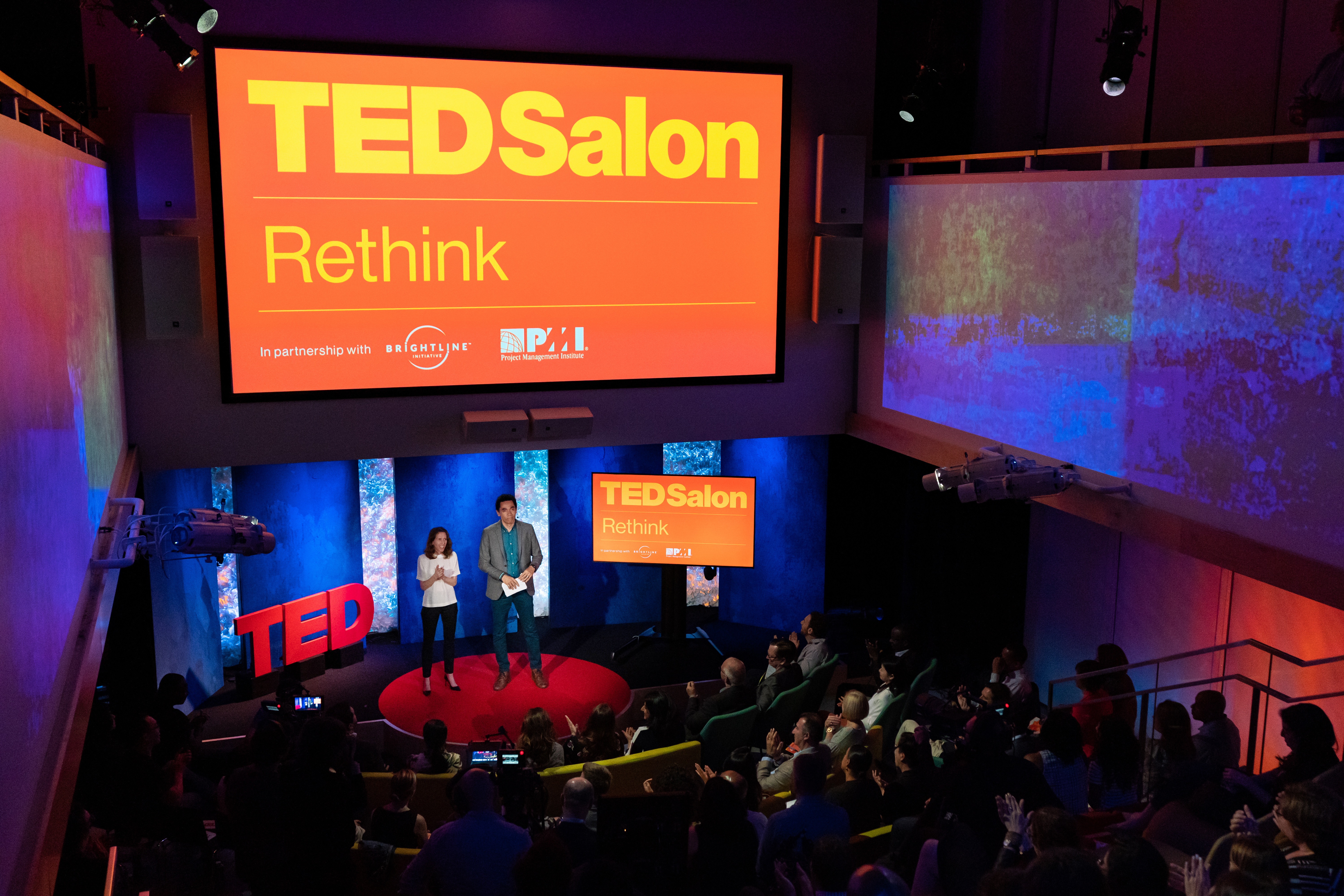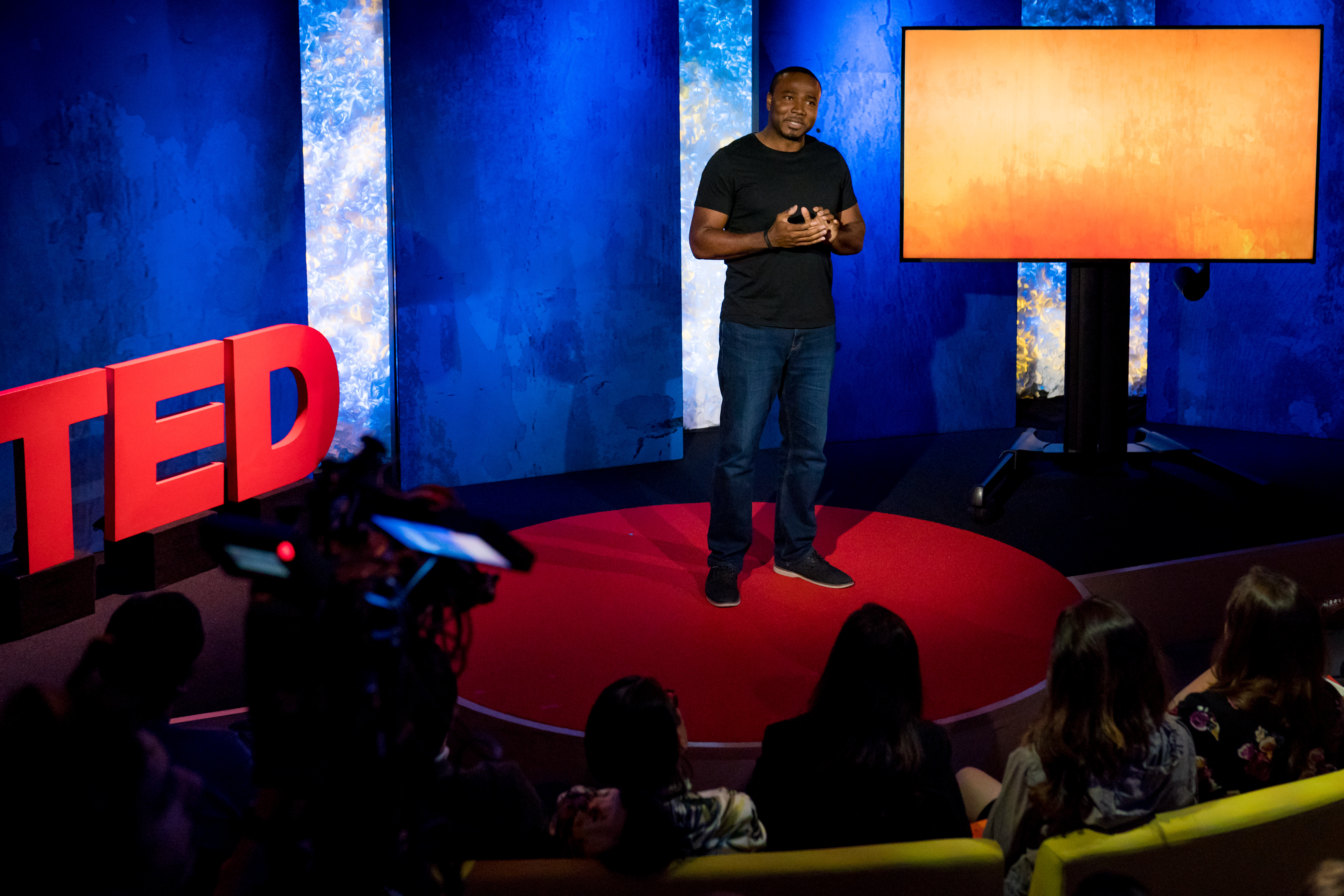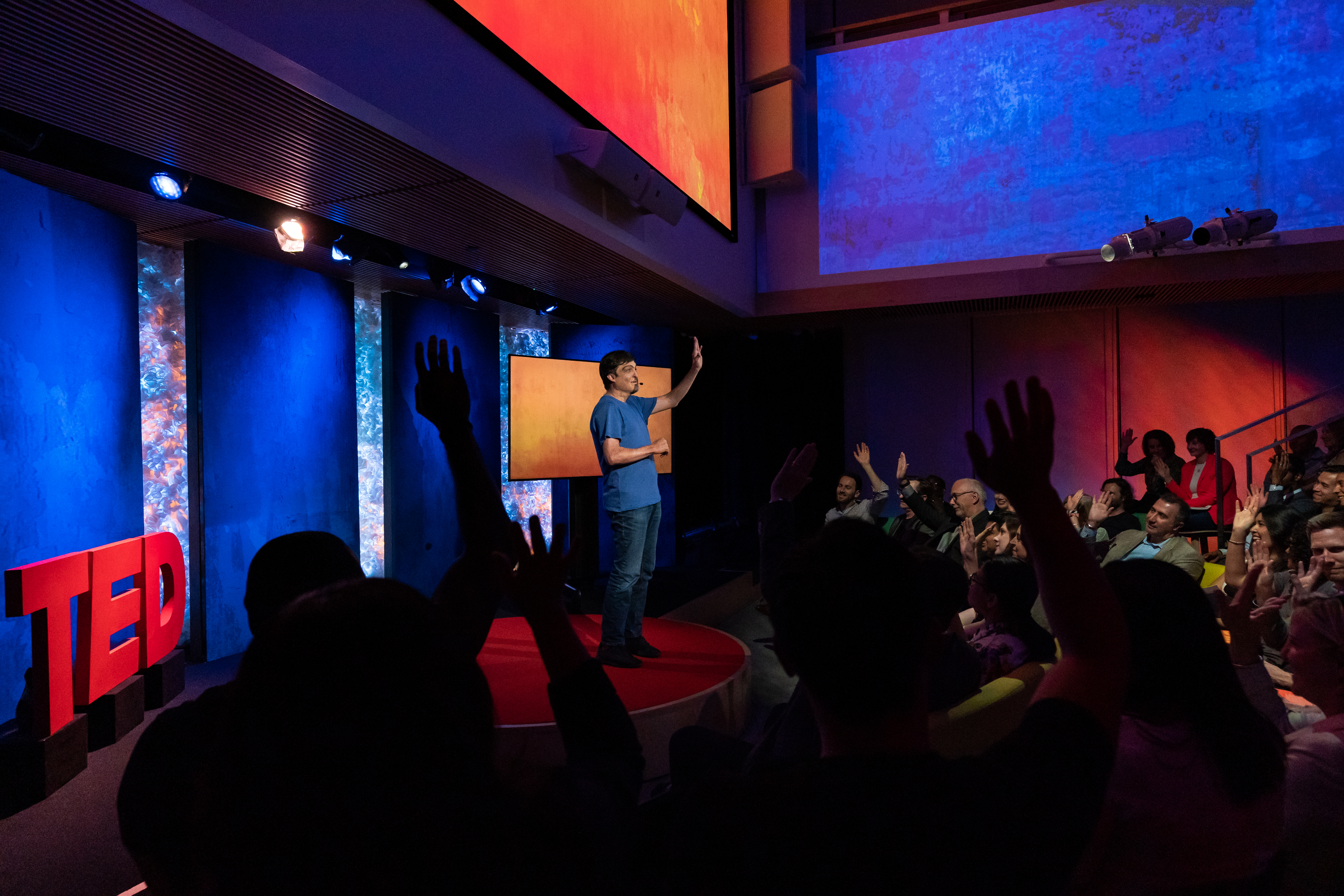
If we want to do things differently, where do we begin? Curators Corey Hajim and Alex Moura host TED Salon: “Rethink,” in partnership with Brightline Initiative at the TED World Theater in New York City on June 6, 2019. (Photo: Dian Lofton / TED)
The event: TED Salon: “Rethink,” hosted by TED business curator Corey Hajim and TED tech curator Alex Moura
When and where: Thursday, June 6, 2019, at the TED World Theater in New York City
The partner: Brightline Initiative, with Brightline executive director Ricardo Vargas warming up the audience with opening remarks
Music: Dark pop bangers from the Bloom Twins

The Bloom Twins, sisters Anna and Sonya Kupriienko, perform their special brand of “dark pop” at TED Salon: “Rethink,” in partnership with Brightline Initiative. (Photo: Jasmina Tomic / TED)
The talks in brief:
Heidi Grant, social psychologist, chief science officer of the Neuroleadership Institute and associate director of Columbia University’s Motivation Science Center
- Big idea: Asking for help can be awkward and embarrassing, but we all need to get comfortable with doing it.
The most important thing about asking for help is to do it — out loud, explicitly, directly. Grant provides four tips to ensure that your ask will get a yes. First, be clear about what kind of help you need. No one wants to give “bad” help, so if they don’t understand what you’re looking for, they probably won’t respond. Next, avoid disclaimers, apologies and bribes — no prefacing your ask with, “I really hate to do this” or offering to pay for assistance, which makes others feel uneasy and self-conscious. Third, don’t ask for help over email or text, because it’s too easy for someone to say “no” electronically; do it face-to-face or in a phone call. And last, follow up after and tell the other person exactly how their help benefited you. - Quote of the talk: “The reality of modern work and modern life is that nobody does it alone. Nobody succeeds in a vacuum. More than ever, we actually do have to rely on other people, on their support and their collaboration, in order to be successful.”
Stuart Oda, urban farm innovator, cofounder and CEO of Alesca Life
- Big idea: The future of farming is looking up — literally.
Recent innovations in food production technology allow us to grow up — 18 stories, even — rather than across, like in traditional farming. The efficiency of this vertical method lessens the amount of water, fertilizer, physical space and chemical pesticides used to generate year-round yields of quality vegetables, for less money and more peace of mind. Oda shares a vision for a not-too-distant future where indoor farms are integrated seamlessly into cityscapes, food deserts no longer exist and nutrition for all reigns supreme. - Fun fact: By 2050, our global population is projected to reach 9.8 billion. We’ll need to grow more food in the next 30 to 40 years than in the previous 10,000 years combined to compensate.

Efosa Ojomo researches global prosperity, analyzing why and how corruption arises. He discusses how we could potentially eliminate it by investing in businesses focused on wiping out scarcity. (Photo: Jasmina Tomic / TED)
Efosa Ojomo, global prosperity researcher and senior fellow at Christensen Institute for Disruptive Innovation
- Big idea: We can eliminate corruption by investing in innovative businesses that target scarce products.
Conventional thinking about reducing corruption goes like this: in order to eliminate it, you put laws in place, development inspires investment, and the economy booms. Prosperity researcher Efosa Ojomo thinks we have this equation backwards. Through years of researching what makes societies prosperous, he’s found that the best way to stem corruption is to encourage investment in businesses that can wipe out the scarcity that spurs coercion, extortion and fraud. “Corruption, especially for most people in poor countries, is a workaround. It’s a utility in a place where there are fewer options to solve a problem. It’s their best solution to the problem of scarcity,” Ojomo says. Entrepreneurs who address scarcity in corruption-ridden regions could potentially eliminate it across entire sectors of markets, he explains. Take, for example, Mo Ibraham, the founder of mobile telecommunications company Celtel. His highly criticized idea to create an African cellular carrier put affordable cell phones in several sub-Saharan African countries for the first time, and today nearly every country there has its own carrier. It’s “market-creating innovations” like these that ignite major economic progress — and make corruption obsolete. - Quote of talk: “Societies don’t develop because they’ve reduced corruption; they’re able to reduce corruption because they’ve developed.”
Shannon Lee, podcaster and actress
- Big idea: Shannon Lee’s famous father Bruce Lee died when she was only four years old, yet she still treasures his philosophy of self-actualization: how to be yourself in the best way possible.
Our lives benefit when we can connect our “why” (our passions and purpose) to our “what” (our jobs, homes and hobbies). But how to do it? Like a martial artist, Lee says: by finding the connecting “how” that consistently and confidently expresses our values. If we show kindness and love in one part of our life yet behave harshly in another, then we are fragmented — and we cannot progress gracefully from our “why” to our “what.” To illustrate this philosophy, Lee asks the audience to consider the question, “How are you?” Or rather, “How can I fully be me?” - Quote of the talk: “There were not multiple Bruce Lees: there was not private and public Bruce Lee, or teacher Bruce Lee and actor Bruce Lee and family-man Bruce Lee. There was just one, unified, total Bruce Lee.”

When’s the last time you ate more, and exercised less, than you should? Dan Ariely explores why we make certain decisions — and how we can change our behavior for the better. (Photo: Dian Lofton / TED)
Dan Ariely, behavioral economist and author of Payoff: The Hidden Logic That Shapes Our Motivations
- Big idea: To change people’s behavior, you can’t just give them information on what they should do. You have to actually change the environment in which they’re making decisions.
To bridge the gap between a current behavior and a desired behavior, you must first reduce the friction, or remove the little obstacles and annoyances between those two endpoints. Then you need to think broadly about what new motivations you could bring into that person’s life. Financial literacy is great, for instance, but the positive impact of such information wears off after a few days. What else could be done to help people put more away for a rainy day? You could ask their kids to send a weekly text reminding them to save money, or you could give them some kind of visual reminder — perhaps a coin — to help even more. There’s a lot we can do to spark behavioral change, Ariely says. The key is to get creative and experiment with the ways we do it. - Quote of the talk: “Social science has made lots of strides, and the basic insight is … the right way is not to change people — it’s to change the environment.”